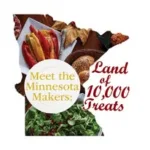|
WHO: |
Beth Dooley, award winning food writer |
||
|
FEATURED PRODUCT: |
The Perennial Kitchen, a cook book inspired by Kernza, a locally grown wheat variation | ||
|
SOCIAL MEDIA: |
Follow @BethDooley on Facebook and @BethDooleysKitchen on Instagram |
||
|
WEBSITE: |
https://www.bethdooleyskitchen.com/ |
By Michelle M. Sharp, Founder and Content Creator of Meet the Minnesota Makers
 “I’m not that great a cook. I’m a really good shopper,” laughs Beth Dooley, James Beard award-winning food writer, author of more than a dozen cookbooks, Star Tribune columnist, and a regular contributor to MPR.
“I’m not that great a cook. I’m a really good shopper,” laughs Beth Dooley, James Beard award-winning food writer, author of more than a dozen cookbooks, Star Tribune columnist, and a regular contributor to MPR.
As a writer always seeking new ideas, she marvels at how the food world has evolved to embrace sustainability. When she was young, she learned to cook with her grandmother. Before they cooked, she had her first lesson in food stewardship as they shopped together at New Jersey farm stands.
Fast forward to when Beth and her husband moved to Princeton, NJ, where Beth found work at the local newspaper. “I was covering everything that other writers didn’t want to cover, like the zoning and planning board meetings. A lot of those meetings had to do with land transition from farmers that were retiring. It’s that old story,” explained Beth. “They were tired of farming and they didn’t have anybody in their family at that time to take over the farm because it was really hard work.”
By the time they left Princeton for Minnesota, the only way you would find a true Jersey tomato was to grow it yourself. The farms of her youthful shopping excursions were gone. Grocery store produce was shipped across the country from California.
Finding Local Food in Minnesota
Discovering the Minneapolis farmers market was a revelation. “I was astounded when I went to the farmers markets for the first time, at how good the food tasted and why it was

Kernza Focaccia Sandwiches
so different. There was so much joy in being able to buy that food directly from people who’d grown it. I thought that was just so cool because it reminded me of growing up with my grandmother.”
To encourage people to prioritize sustainable food choices, Beth stresses the need to find someone’s “in,” the ah-ha element that connects them to the regional food web. Beth’s connection has always been the flavor of the food she cooks for herself and others, whether at home or an event. Once she asked herself why locally-grown food tastes different, it led her to other steps along the path of food production that inform flavor. Sustainability plays a major role because it’s so important for soil quality. “You can’t have good food without good soil quality,” said Beth. “You just can’t.”
Why cook with Kernza?
That is why Beth Dooley is so excited about a new planet-friendly grain grown in Minnesota. Kernza® perennial grain has massive root structures that reduce soil erosion and improve water quality. With tap roots that reach ten feet or more into the soil, this grain is remarkably tolerant of extreme weather—both in the form of drought and storms.
Beth describes Kernza as a nutty grain with warm cinnamon undertones. It’s a thirsty grain that loves to absorb butter. Beth describes it as being a bit “moody,” preferring warm pairings like ginger or chocolate to lighter citrus tones. Beth also recommends it as a breakfast cereal. It cooks up like cream of wheat—you just need to set it to simmer until it falls apart and enjoy–perhaps with a splash of local maple syrup or a dollop of honey. She also loves to use it in a pilaf or this shortbread cookie.
 The Perennial Kitchen Cookbook
The Perennial Kitchen Cookbook
Beth published The Perennial Kitchen in 2021 to pave the way for more home cooks to enjoy the warm flavor of Kernza, and other more sustainable ingredients, for themselves. “My goal was to focus on how to get more regenerative foods into home kitchens. I want to help consumers recognize that regenerative or sustainable agriculture are not marketing terms. They address how the food is grown,” shared Beth. “This book tries to educate, inform, excite, and inspire people to think about the practices behind their food, not just the labels.”
What’s between the recipes in a cookbook is often just as important as the lists of ingredients, cooking times, and suggested pairings. Recognizing the power and influence of home cooks permits this cookbook to be an agent of change.
For Beth, a kitchen is a place of inspiration, for herself and others. “It’s my living lab,” she explained. “What makes writing cookbooks fun is that it allows me to educate with a message that’s part seduction, part entertainment, and part instruction. Some people tell me that they like to take my books to bed and read them. I love that. I am grateful to have that way into their homes, to their way of thinking. The greatest compliment is when I see one of my cookbooks that’s been splattered and stained. Then I know that it has been used.”
The Perennial Kitchen is a reminder of our individual power. In the introduction Beth writes, “Cooking is an act of showing up in the world, of caring for ourselves and for others… Cooking is simple; it’s powerful yet it needn’t be overwhelming… The sum of our daily choices will ultimately impact our collective future. If you’re hungry for home and comfort, cooking is a great place to start.”
How to Shop and Eat More Sustainably
What other steps does Beth recommend to the home cook looking for more sustainable practices?

Mini Black Bean Kernza Oat Cakes
*Shop the co-ops, especially their produce and bulk sections.
*Get to know your farmers markets.
*Find simple recipes that speak to you. That will make it more likely that you will want to cook at home.
*Cook whole grains and dried beans.
*Don’t expect to make everything yourself. It’s okay to pick up a roasted chicken or stop at the local bakery.
*Ask questions. Be curious.
“Take care of yourself. When you take care of yourself, you take care of your family and friends. It all goes downstream to impact the environment, but it starts with you at the pot or with your knife at the cutting board,” shared Beth.
Find Recipes, Buy Kernza, Explore a New Cookbook!
Follow @BethDooley on Facebook and @BethDooleysKitchen on Instagram for recipe inspiration.
Visit https://www.bethdooleyskitchen.com/ for recipes and a listing of Beth’s books.

Kernza Shortbread
Explore your own copy of The Perennial Pantry at the University of Minnesota Press.
Ready to try Kernza perennial grain at home? Visit https://kernza.org/consumers/ or https://perennial-pantry.com/ to order.
This feature is sponsored by the Forever Green Initiative at the University of Minnesota. Beth Dooley’s Kitchen is one of several innovators in sustainability that Meet the Minnesota Makers and Forever Green celebrate in this maker series.
Forever Green develops and improves winter-hardy annual and perennial crops (including Kernza!) that protect soil and water health. These initiatives provide new economic opportunities for growers, industry and communities across Minnesota. Learn more about Forever Green and their community partners on their website.
 Visit meettheminnesotamakers.com or follow @meettheminnesotamakers on Facebook and Instagram to discover the small business owners leading Minnesota on a tasty sustainable path forward. Meet the Minnesota Makers is a news site that connects you to the local food, farms, artists and artisans that make Minnesota thrive.
Visit meettheminnesotamakers.com or follow @meettheminnesotamakers on Facebook and Instagram to discover the small business owners leading Minnesota on a tasty sustainable path forward. Meet the Minnesota Makers is a news site that connects you to the local food, farms, artists and artisans that make Minnesota thrive.







